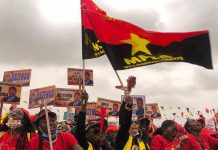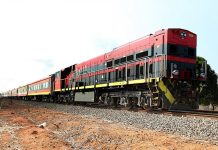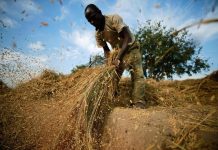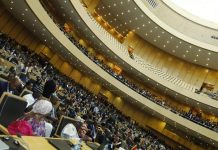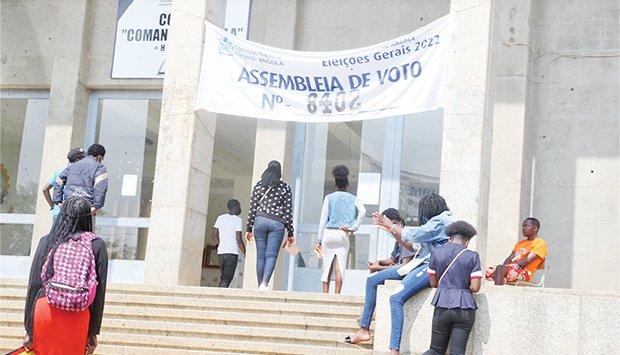
Africa-Press – Angola. The General Elections of 24 August divide attention between the new and old generation of voters, namely those who vote for the first time and those who have been voting since 29 and 30 September 1992, to choose the President of the Republic and the 220 deputies to the National Assembly.
The press reporting team found, during a tour of the city of Huambo, that young people without active voting age (18 years old) in 2017 are now eager to vote for the first time. Basílio Miguel, 19 years old, torn between euphoria and certainty, confirmed that he was emotionally prepared to participate in the electoral process, consciously contributing to the voting of the leaders who will lead the country in the next five years.
“For me, voting is making the right choice, because with my vote I will help elect the President of the Republic and the deputies to the National Assembly, a process that takes place every five years. I still feel that butterflies in my stomach, knowing that I’m going to vote for the first time. It’s a great responsibility, hoping that my vote will make all the difference and help to build an increasingly better country for all Angolans, especially for the youth, who are the majority of the country’s population ” , refers.
Basílio Miguel says that he carried out the electoral registration, he always carries his voter card with him, having consulted his data and he already knows that he will vote at Escola 28 de Agosto, in Rua do Comércio, whose assembly and polling station were identified by him, which gives you the guarantee that nothing will get in the way of your free will to vote.
Voters For The Fifth Time
António Mateus Pacheco, who participated in all the elections held in the country, says that the first time he voted, in 1992, it was a different and difficult experience, as the country was emerging from an armed conflict and shortly after entered another war of apocalyptic proportions, causing millions of deaths, internally displaced persons, widows and orphans.
He says that at the time the voting process was done through two separate ballot papers, the first for the presidential and the second for the legislative ones, so many people could not identify the two documents, which resulted in many invalid votes.
At the time, 21 years old, António Pacheco says that on the days indicated for voting, the 29th and 30th of September, the whole world was ready to exercise the right to vote, but there was a lot of agitation, especially in Huambo, since the the spirits of those responsible for some political parties and their militants were very high, which did not guarantee a feeling of security for many voters.
“Looking at the history of the electoral processes already carried out and being on the way to the fifth election, things have changed a lot, we are in a globalized world and every day there are new things, the political game is different, since information reaches voters quickly” , points out.
In 1992, the scenario of the electoral process changed drastically with the publication of the final results, re-emerging the war that left the country devastated. For the new generation that will vote for the first time, António Pacheco asks for calm and advises them to avoid everything that jeopardizes the sovereignty of the country, since we already had a bitter experience in 1992, where the euphoria of the voters resulted in the devastation of the country.
Celestino Kapiñgala is another voter who has followed all electoral processes from 1992 to today. He recalls, with some bitterness, that the first election was very agitated, because the context was still war and the organizing committee for the elections did not reach all parts of the country, where some military forces were still armed to the teeth, creating in these areas a atmosphere of great terror.
“At that time, the biggest scare was during the publication of the final results and that triggered another civil war, but now the context is different, and young people must be very careful and face the process with great serenity, because Angola needs the effort of each one for the happiness of all”, he concluded.
Arão Cangandjo Dumbo, 20, says that he keeps the voter’s card as a real treasure, because the desire to be in front of a polling station, to exercise the duty of citizenship, is a great responsibility, for being sure of projecting a great choice for the future of the country.
“I will participate for the first time in the election of our President, Vice-President and the 220 deputies who will represent us in the National Assembly. At first I had some doubts about the process, but I have already been clarified by the civic agents of the National Electoral Commission (CNE). ). Now I am available to carry out the right to vote and I believe that everything will go well, because voting is a civic and patriotic duty, in which citizens aged 18 and over have to vote for a better country”, he reinforces.
Arão Cangandjo appeals to young people to vote, because those who do not vote lose the right to complain about the conditions in the country.
Celina Isabel, who will also vote for the first time at the school in the centrality of Lossambo, said she was anxious to vote. When there are 20 days left for the vote, she says that she will get information from the civic agents of the CNE to dispel all doubts about the process, so that when the 24th arrives she does not fail.
For More News And Analysis About Angola Follow Africa-Press

